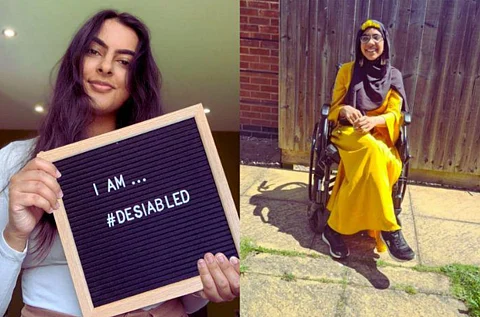
- HOMEGROWN WORLD
- #HGCREATORS
- #HGEXPLORE
- #HGVOICES
- #HGSHOP
- CAREERS
- ABOUT US
- CONTACT US

As populations grow, a big part of society continues to be excluded — people with disabilities. Unlike any other marginalized group, anyone can become a member of the disabled community at any point in their life. People can develop a physical disability because of an accident, illness, or simply old age. Yet this community is so often unacknowledged and stigmatized.
De-stigmatization comes from representation. Even in a so-called progressive era, most of us are ignorant about the different forms of disabilities and their effects on people’s daily life unless it’s someone we know. The isolation and loneliness people with disability are sometimes subjected to is an additional obstacle that stops them from living a fulfilling life. Along with making spaces more accessible in our cities, education, awareness, and a safe mental space to openly talk about the challenges and unique life experiences of someone living with a disability are extremely crucial.
We’ve curated a list of some platforms providing space and inclusivity for individuals with disabilities.
I. Revival Disability India
Revival Disability Magazine is a digital media project on disability, sexuality and intersectional ableism ‘for disabled and queer folks, by disabled and queer folks’. The organization aims to be a revolution of the disabled self to re-claim and re-define stories of disability in India. They aim to make progress through first-person narratives of lived experiences and create an accessible queer utopia that echoes their overall vision of inclusion and accessibility.
Find them here.
II. Chronically Brown
Chronically Brown is a non-profit organization founded by Sukhjeen Kaur, shortly after being diagnosed with Rheumatoid Arthritis. Now, with a full team of advisors, facilitators and more, this NPO works towards tackling the stigma of disability within the South Asian community and diversifying the disabled community with campaign projects such as #desiabled. They have a range of services designed to work towards this such as workshops, discussion groups, and many online resources.
You can find them here.
III. Association of People with Disability
APD works towards the education, employment, and rehabilitation of individuals with disabilities. To create more accessible spaces and healthcare and add inclusivity to the lives of the disabled, The Association of People with Disability produces mobility aids and accessible technologies under an Assistive and Adaptive Technology initiative to empower people with disabilities not just within APD but also in public institutions. These devices promote social interaction, boost independence, and minimise pain; all of which improve social involvement, contribution, and inclusion.
Find them here.
IV. Cripalicious
Cripalicious is a community dedicated to challenging ableism and creating representation for people with disabilities, more specifically, invisible disabilities. It started in 2021 when Gouri Bhuyan, a postgraduate in Psychology from the University of Mumbai had had enough of inclusivity and diversity becoming some kind of marketing gimmick without actually bringing positive change in the community. She creates refreshing content for and about people like her. As a mental health professional, she believes that developmental psychology is largely responsible for setting, and measuring, norms across the lifespan, thus creating and perpetuating ideas of ‘abnormality’ – which work against people with disabilities.
You can find her page here.
